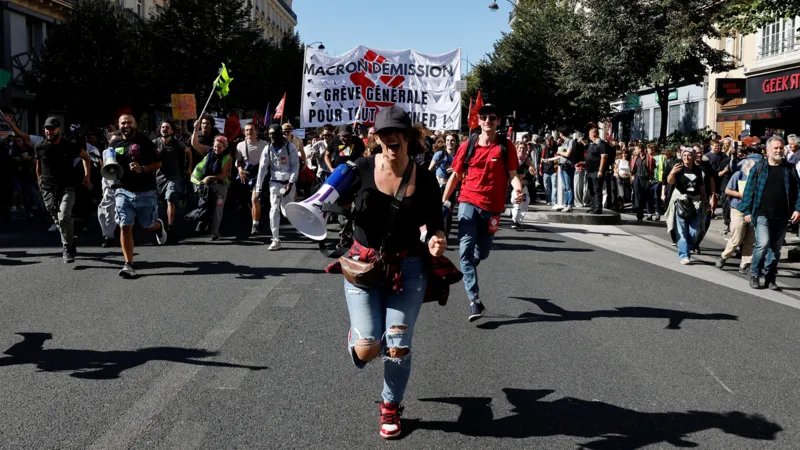Hundreds of thousands of workers took to the streets across France on Thursday in nationwide strike action against government budget cuts, following calls by trade unions for mass protests.
Organisers estimated turnout at around one million people, though the interior ministry placed the figure closer to 500,000. Authorities deployed 80,000 police officers nationwide, with scuffles reported in Lyon and Nantes, and clashes breaking out in central Paris. Police in riot gear used tear gas and shields to disperse demonstrators after some damaged businesses and buildings.


The strikes disrupted public transport, leaving several Paris metro lines closed. Protesters also blocked major roads across the country, while students gathered outside schools and universities, blocking entrances and chanting slogans. About one-third of teachers joined the walkout. Pharmacists participated in large numbers, with 98% of pharmacies expected to remain shut.
The interior ministry confirmed more than 300 arrests nationwide.
Union leaders demanded greater investment in public services, higher taxes on the wealthy, and the reversal of austerity measures proposed by former Prime Minister François Bayrou’s government before its collapse last week. Bayrou’s €44 billion austerity plan, aimed at reducing France’s public debt, triggered a no-confidence vote in parliament.
Sébastien Lecornu, appointed prime minister last week after Bayrou’s ouster, has yet to form a government. While he has signalled willingness to compromise, he has not ruled out cuts. With a hung parliament divided across three political blocs, analysts say Lecornu faces an uphill task in passing any budget.
France’s debt crisis looms large, with public debt now estimated at nearly €50,000 per citizen. Two of Lecornu’s predecessors, Bayrou and Michel Barnier, also lost their positions after failing to secure support for deficit-reduction budgets.

Union leaders insist the solution lies in taxing the wealthiest rather than cutting essential services. “We need to be out in force, that’s how we gather strength to keep fighting,” said Sophie Binet, head of the CGT union. “The government’s policies only serve the richest.”
Protesters expressed frustration with President Emmanuel Macron’s economic direction. “Macron’s policies don’t suit me, nor did Bayrou’s budget,” said Cyrielle, a 36-year-old IT worker marching in Paris. “If the new government leaned more to the left, that would be the beginning of a solution.”
Despite appeals from left-wing leader Jean-Luc Mélenchon for demonstrators to remain disciplined, officials voiced concern about possible unrest. Paris prosecutor Laurent Nunez warned of far-left groups attempting to “derail” the protests and urged businesses in the city centre to close.
Thursday’s strike follows last week’s demonstrations by the grassroots Bloquons Tout (“Let’s Block Everything”) movement, which saw around 200,000 protesters nationwide.
As Lecornu attempts to chart a path forward, trade unionist Alexandre Dubois summed up the mood: “We’d like more stability in government, but above all, we want workers to be taken into account. France must move away from this logic of short-term economic performance.”




